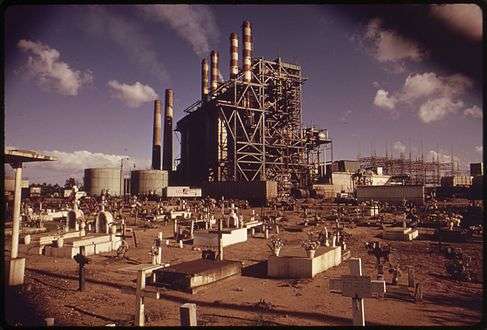Puerto Rico Electric Power Authority
 | |
| Agency overview | |
|---|---|
| Formed | May 2, 1941 |
| Jurisdiction | executive branch |
| Headquarters | San Juan, Puerto Rico |
| Agency executive |
|
| Key document | |
| Website | www.aeepr.com |
The Puerto Rico Electric Power Authority (PREPA) —Spanish: Autoridad de Energía Eléctrica (AEE)— is an electric power company and the government-owned corporation of Puerto Rico responsible for electricity generation, power transmission and power distribution in Puerto Rico.[1] PREPA is the only entity authorized to conduct such business in Puerto Rico, effectively making it a government monopoly. The authority is ruled by a board of directors appointed by the governor with the advice and consent of the Senate.
History
PREPA was originally named the Puerto Rico Water Resources Authority (PRWRA) —Spanish: Autoridad de las Fuentes Fluviales (AFF)— which was created by Law No. 83 of May 2, 1941[2] during the governorship of Rexford G. Tugwell. Government-owned, PRWRA unified diverse regional and local electric power companies into one unified electric grid.
Structure
Board of directors
The board of directors is the governing body of the Puerto Rico Electric Power Authority. Its membership usually consists of private citizens who are supposed to represent the public interest and may or may not include exofficio political officeholders (typically the Secretary of Economic Development and Commerce). This inconsistency happens as the board's structure changes whenever a political party gains power, usually every 4–8 years. Once both the governor and the legislature of Puerto Rico belong to the same party, one of the earliest laws amended is the one governing the authority in order to change the board's composition. Once the new board is settled in, one of the very first acts enacted by the new board is to appoint a new executive director. This constant back and forth effectively makes the authority a highly politicized tool rather than a resource for the people of Puerto Rico, and, consequently, changes the vision, strategy, and plans of the authority every 4–8 years according to the political party in power.
Of the different members of the board, the governor is usually required to appoint four members with the advice and consent of the Senate. It is through these members, along with the incumbent political officeholders which serve as exofficio, the way in which the governor and the political party in power effectively control the authority. Three additional members of the board are directly elected by consumers by plurality-at-large; two of them by residential consumers and one by commercial ones.
The last structural change to the board occurred on June 25, 2013 after governor Alejandro García Padilla enacted Act 29 of 2013 together with the 17th Legislative Assembly.[3] The act effectively replaced the incumbent board with an entirely new board, as follows:
| Role | Representation | Name | Appointed by García Padilla | Remarks |
|---|---|---|---|---|
| Chairman | Public interest | Harry Rodríguez García | |
Chemical engineer, Vice President and General Manager of Abbott Laboratories Puerto Rico |
| Vice Chairman | Elected by consumers | Agustín Irizarry Rivera | |
Professor of electrical engineering at the University of Puerto Rico |
| Secretary | Exofficio | Miguel Torres Díaz | |
Secretary of Transportation and Public Works |
| At-large | Exofficio | Alberto Bacó Bagué | |
Secretary of Economic Development and Commerce |
| At-large | Public interest | Andrés Salas Soler | |
former judge and attorney-at-law |
| At-large | Public interest | Javier Quintana Méndez | |
Dean of the school of engineering of the Interamerican University of Puerto Rico |
| At-large | Elected by consumers | Juan Rosario | |
environmental activist |
| At-large | Elected by consumers | vacant | |
|
| At-large | Public interest | vacant | |
Power plants
PREPA serves close to 1.5 million customers through several power plants:[5][6]
| Power plant | Capacity | Energy source | Ownership | Owner | Operator | Location |
|---|---|---|---|---|---|---|
| AES Ilumina[7] | 24 MW | solar power | private | AES Corporation | AES Corporation | Guayama |
| AES Puerto Rico[8] | 454 MW | coal | private | AES Corporation | AES Corporation | Guayama |
| Aguirre Combined Cycle[9] | 592 MW | heavy fuel oil | publicly owned | PREPA | PREPA | Salinas |
| Aguirre Thermoelectric[9] | 900 MW | diesel oil | publicly owned | PREPA | PREPA | Salinas |
| Cambalache | 247 MW | diesel oil | publicly owned | PREPA | PREPA | Arecibo |
| Costa Sur | 990 MW | heavy fuel oil | publicly owned | PREPA | PREPA | Guayanilla |
| EcoEléctrica[10] | 510 MW | natural gas | private | Gas Natural Fenosa, International Power | Gas Natural Fenosa | Peñuelas |
| Oriana Solar Farm[11] | 45 MW (58MW(DC)) | solar power | private | Sonnedix | Sonnedix | Isabela |
| Palo Seco | 602 MW | heavy fuel oil | publicly owned | PREPA | PREPA | Cataño |
| Punta Lima | 26 MW | wind power | private | Sovereign Bank[12] | Gestamp Wind | Naguabo |
| San Juan Combined Cycle[13] | 464 MW | diesel oil | publicly owned | PREPA | PREPA | San Juan |
| San Juan Thermoelectric[13] | 400 MW | heavy fuel oil | publicly owned | PREPA | PREPA | San Juan |
| San Fermin Solar Farm[14] | 26 MW | solar power | private | Uriel Renewables and Coqui Power | Uriel Renewables and Coqui Power | Loiza |
| Santa Isabel Wind Farm[15] | 75 MW | wind power | private | Pattern Energy[16] | Pattern Energy | Santa Isabel |
| Windmar Ponce[17] | 4.5 MW | solar power | private | Windmar Renewable Energy | Windmar Renewable Energy | Ponce |
Puerto Rico has 21 hydroelectric plants rated at a combined 156MW.[18][14]
Subsidiaries
The public corporation also provides fiber optic broadband to private carriers through one of its subsidiary, PREPA Networks. PREPA is also studying the possibility of selling energy to the United States Virgin Islands with the installation of an underwater power cable between Fajardo and the island of St. Thomas—similar to the power cable with which it services its clients in Vieques and Culebra, which are also islands.[19]
Labor unions
There are four labor unions that represent the workers from the authority exclusively UTIER, UITICE, UEPI, and UPAEE.[20][21]
Finances

As of 2014 the authority carries liabilities of $10.1 billion USD against assets of $6 billion.[22] It also operates with a deficit of about $354 million against revenues of $4.8 billion.[23][24] In terms of costs, $2.6 billion or about 58% of PREPA's expenses are attributed to fuel purchases alone while salaries and collective bargains represent less than 13% of the authority's expenses.[24]
On May 23, 2014, Citigroup severely curtailed PREPA's line of credit for fuel purchase, forcing PREPA to run out of cash to pay Petrobras, its main oil supplier. Petrobras, in turn, threatened to cut off further shipments to the authority. This forced the authority to take $100 million out of its Capital Improvements Fund in order to pay its debt to Petrobras. PREPA argues that the different agencies of the government of Puerto Rico owe them more than $290 million in debt, while an additional $375 million of revenue is lost through subsidies enacted by the Puerto Rican legislature.[25][26][27][28][29] An additional $600 million is owed to the authority by residential and commercial consumers, some of them by consumers living in public housing.[30][31] The authority argues that it wouldn't have a problem being self-sufficient if it were paid the aforementioned debt and if it weren't forced to give out subsidies. On June 3, 2014, senator Ramón Luis Nieves admitted publicly that, "part of the financial problem at PREPA was provoked by the government and the Puerto Rican legislature."[29]
On June 11, 2014, Fitch Ratings downgraded its rating on the authority's to speculative non-investment grade ("junk status") from BB+ to BB while putting the authority on negative rating watch.[32]
Gallery
-

Palo Seco Power Plant, 1973. Photo by John Vachon.
References
- ↑ "Ley de la Autoridadf de Energia Electrica de Puerto Rico" (PDF). Presupuesto.gobierno.pr. Retrieved 2015-03-03.
- ↑ "Welcome to PREPA". Prepa.com. Retrieved 2015-03-03.
- ↑ Act No. 29 of 2013 (in Spanish)
- ↑ https://web.archive.org/web/20140626024817/http://www.aeepr.com/jg/membersjg.asp. Archived from the original on June 26, 2014. Retrieved May 31, 2014. Missing or empty
|title=(help) - ↑ "Proponen suspender subsidios de la AEE por seis meses | El Nuevo Día". Elnuevodia.com. 2014-06-25. Retrieved 2015-03-03.
- ↑ "Welcome to PREPA". Prepa.com. Retrieved 2015-03-03.
- ↑ "Press Release". AES Solar. September 30, 2011. Retrieved September 7, 2013.
- ↑ "AES : Homepage". Aespuertorico.com. Retrieved 2015-03-03.
- 1 2 "Central Aguirre" (in Spanish). Puerto Rico Electric Power Authority. Retrieved September 2, 2013.
- ↑ https://web.archive.org/web/20090416233535/http://ecoelectrica.com/ourfacilities/ourpowerplant.html. Archived from the original on April 16, 2009. Retrieved July 28, 2011. Missing or empty
|title=(help) - ↑ Oriana and Yarotek connect Caribbean’s largest solar project to grid, pv-tech, Tom Kenning Sep 15, 2016
- ↑ Kantrow, Michelle (March 12, 2013). "Punta Lima wind farm sold to Sovereign Bank for $88M". News Is My Business. Retrieved September 7, 2013.
- 1 2 "Central San Juan" (in Spanish). Puerto Rico Electric Power Authority. Retrieved September 2, 2013.
- 1 2 PUERTO RICO Puerto Rico Profile, Territory Profile and Energy Estimates, U.S. Energy Information Administratrion, December 18, 2013
- ↑ Alvarado León, Gerardo (August 29, 2013). "Funcionando a máxima capacidad el parque eólico de Santa Isabel". El Nuevo Día (in Spanish). Retrieved August 29, 2013.
- ↑ "Finca de Viento Santa Isabel". Pattern Energy. Retrieved August 29, 2013.
- ↑ "En Ponce la finca fotovoltaica más grande". La Perla del Sur (in Spanish). Retrieved September 7, 2013.
- ↑ Puerto Rico, Renewable Facts
- ↑ (PDF) https://web.archive.org/web/20130510150017/http://www.edinenergy.org/pdfs/51294.pdf. Archived from the original (PDF) on May 10, 2013. Retrieved May 31, 2014. Missing or empty
|title=(help) - ↑ "La AEE es" (in Spanish). Puerto Rico Electric Power Authority. Retrieved August 6, 2013.
- ↑ Unión de Trabajadores de la Industria Eléctrica y Riego vs. Héctor Medina Torres, 2011 CD 01 (November 7, 2011).
- ↑ "Edición 14 de Abril 2014 by El Vocero de Puerto Rico". ISSUU. Retrieved 2015-03-03.
- ↑ "Gobernador y Junta Gobierno discuten finanzas AEE | El Vocero de Puerto Rico". Elvocero.com. Retrieved 2015-03-03.
- 1 2 "Financial Statements, Required Supplementary Information and supplemental Schedules" (PDF). Pr.gov. Retrieved 2015-03-03.
- ↑ "AEE solicita al gobierno que suelte dinero para que agencias puedan pagar la luz – Metro". Metro.pr. Retrieved 2015-03-03.
- ↑ "Revisarán subsidios AEE y deudas de gobierno – Metro". Metro.pr. Retrieved 2015-03-03.
- ↑ https://web.archive.org/web/20140531101326/http://www.elnuevodia.com/subsidiospor1millonaldia-1623521.html. Archived from the original on May 31, 2014. Retrieved May 31, 2014. Missing or empty
|title=(help) - ↑ "Propuesta #4". Bajemos la factura. Retrieved 2015-03-03.
- 1 2 Alvarado León, Gerardo (June 3, 2014). "Legislatura evaluará los subsidios energéticos". El Nuevo Día (in Spanish). printed version.
- ↑ "Propuesta #3". Bajemos la factura. Retrieved 2015-03-03.
- ↑ "Sube como la espuma la deuda millonaria que tiene los abonados de residenciales públicos con AEE -NotiUno 630 | Primeros Con La Noticia". Notiuno.com. 2014-06-20. Retrieved 2015-03-03.
- ↑ "UPDATE 1-Fitch cuts Puerto Rico electricity authority's rating again". Reuters. 2014-06-11. Retrieved 2015-03-03.
External links
- www.aeepr.com - official site (Spanish)